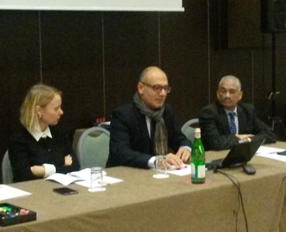“The key is cooperation. Emigration in Europe and the development of the Horn of Africa”
With this title, last Wednesday, November 1st 2015, took place in Rome a working breakfast organised by the FPSC’s Middle East Studies Centre.
Speakers: Fessahazion Pietros Menghistu, Ambassador of Eritrea in Italy and Suzanna Tkalec, Humanitarian Director of Caritas Internationalis.
Menghistu, the ambassador, presented a general view of the socio-economic conditions in Eritrea, worsened by the “continuous situation of international threat in the country and the unfair sanctions the country suffers”.
Eritrea is still one of the poorest countries in the world and, despite the relevant investments in training, infrastructures or development politics, youngsters –who are forced to do a poorly-payed compulsory military service that quite often stretches on indefinitely due to security reasons, don’t have any other choice than immigrating to Europe. If they request for political asylum, they get it in around 2 weeks. Despite this, they don’t emigrate because of an opposition to the government, but due to economical reasons. That’s why it is necessary to “seriously dialogue, being cooperation between Eritrea and Europe”.
Suzanna Tkalec has dealt with the migratory emergency situation, highlighting most of them are middle class Syrians, Afghans and Eritreans who are able to meet the cost of the travel.
The Humanitarian Director of Caritas Internationalis, social and humanitarian branch of the Catholic Church, has explained how only 50% of the refugees’ needs are covered. That’s why the alternative is emigration.






